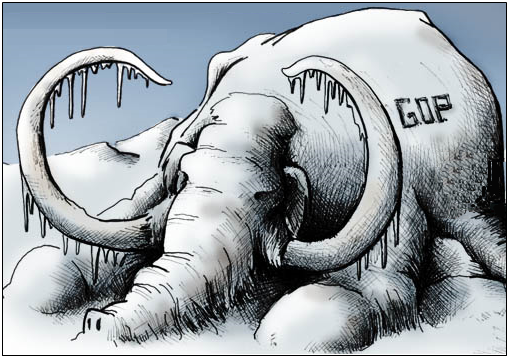By Printus LeBlanc
As the Republican party struggles to send out a basic message, they are missing the opportunity to hammer the Democratic Party for intrusive government regulations. Disruptive industries, run and used by Millennials mostly, have sprung up to challenge the old guard monopolies around the nation. Republicans have a chance to plant their flag as the party standing up for Millennials. I hope they don’t blow it.
Analysts call it the sharing economy. Uber and Lyft are services that allow a person to use their private vehicle to give another person a ride or deliver food for a fee. Millions of people use the services, and thousands more use the services to supplement their income.
This has upset thousands of taxi drivers around the U.S. for two reasons. First, taxi drivers face many more regulations and fees associated with the job. In comparison, an Uber driver faces almost no regulations. Second, the ride sharing economy is competition to the taxi monopolies in the major metropolitan areas.
It is difficult to compile nation-wide data on how much Uber and Lyft are costing the taxi companies, but data from Los Angeles is telling. Since ride sharing began in Southern California, the number of trips taken by taxis has fallen by 30 percent.
The taxi monopolies are not taking the competition lying down, and have launched an all-out assault on the ride sharing companies by using city and state legislatures to burden the competition with the fees and regulations. And who controls most city councils in large metropolitan areas?
Airbnb is another sharing service. If a person has an empty room in their home, the service allows them to rent out their room. Just as ride sharing is cheaper than taxis, the prices for a room through Airbnb is normally cheaper than a hotel, and they do not like the competition.
The hotel industry is turning up the heat by doing the same thing the taxi industry is. They are using local and state legislatures to institute more fees and regulations, passing the cost onto the customer.
Of course, the hotel industry could offer a better product and/or a competitive price if they wished to compete with the upstart company. Instead, the American Hotel and Lodging Association states their objective is to, “Build on the success of 2016 efforts to ensure comprehensive legislation in key markets around the country and create a receptive environment to launch a wave of strong bills at the state level while advancing a national narrative that furthers the focus on reining in commercial operators and the need for commonsense regulations on short-term rentals.” Everything is about bigger government, and nothing is about improving service.
Vaping is another new disruptive technology. Vaping is nothing more than inhaling water vapor from a device called a vaporizer. The liquid used in the vaporizer is usually flavored and contains nicotine. Millions are using this as a way to quit smoking, while millions more just enjoy vaping. Once again, big corporations are turning to government to protect their business.
Some major cigarette companies did try to compete with the new technology by entering the market with their own version of an e-cigarette, but they offered an inferior product that could not compete with the upstarts. Large tobacco companies took their plight to the FDA and asked for a ban on certain vaping products.
It seems the cries of the big tobacco did not go unnoticed, and the Obama FDA issued a rule in 2016 that deemed e-cigarettes, which have no tobacco, to be treated like tobacco. Because of that rule vaping could come to an end shortly. There is a November 8, 2016, deadline to file an application to sell the product with the FDA, and the FDA has two years to review the product and decide if it should be allowed on the market. Even if the company spends millions in compliance costs, if the FDA does not get to the application by 2019, the product must still be pulled. All small government Republicans should be against this form of crony capitalism.
Why should the Republican party care about these issues? First, the party should maintain the stance of low taxes and minimal regulation are the best ways to grow an economy. A growing economy creates more jobs and tax revenue than an overburdened economy.
Second, the majority of the people using the services are millennial. Airbnb estimates roughly 60 percent of all guests booked through their service are Millennials. 60 percent of those that vape are millennial, and over 50 percent of ride sharing services users are Millennials.
In 2016, the two largest voting blocs were the Baby Boomers and Millennials. Each group comprising roughly 31 percent of the eligible voters. The trend is expected to continue moving forward with Millennials making up the plurality of the voting public in 2020.
Americans for Limited Government Vice President of Policy, Robert Romano stated, “According to the 2016 CNN exit poll, President Donald Trump actually won among 30 to 39-year-olds in Michigan, 46 to 45 percent, which made a huge difference in tipping the Electoral College to the GOP. Republicans have more support among Millennials than they realize, which will be critical in the coming years, as Millennials as a generation are now larger than Baby Boomers. To build on this new base of younger voters, the GOP must innovate. Speaking against the regulations that threaten the companies Millennials patronize is as good a place to start as any, in addition to the overall economy and job creation messages.”
While slightly less than half of eligible millennial voters voted in 2016, a full 60 percent voted for Democrats. Republicans would be foolish not to attack the Democrat Party over the regulations and taxes on services and goods that Millennials use. This is a chance to give Millennials a reason to vote for Republicans. I hope they don’t blow it.
Printus LeBlanc is a contributing reporter with Americans for Limited Government.







